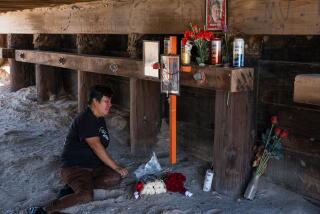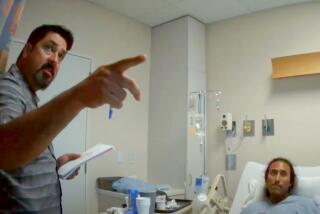Children Still Ponder Father’s Guatemala Death : Killing: For 5 years, the mystery behind Michael DeVine’s slaying has torn at his family. They seek an answer now that charges of a CIA link have arisen.
- Share via
CHINO — It has been gut-wrenching enough, trying to reconcile the death of their father in a Guatemalan pine forest, his body--all but decapitated--leaning against the back tire of his Ford Club Wagon.
And now, nearly five years later, the two grown children are learning from media accounts that the 1990 slaying of their father, Michael DeVine, is playing a major role in an official Washington imbroglio between the CIA and the Clinton Administration.
On Friday, President Clinton demanded a full accounting of how a paid CIA informant apparently was responsible for DeVine’s slaying, as well as the execution of an American lawyer’s husband, and whether the agency had withheld crucial information about the deaths from the White House.
“I’ve always wanted to get to the bottom of his death,” said Conrad DeVine, 21, who last saw his father on his 16th birthday. “I’ve wanted peace. Now that I read that the CIA is somehow involved, I’m really confused.”
“I’m hoping now that there will be some answers,” said Marie DeVine, 24, as she pored over an old family scrapbook.
The two grown children--who were born in Guatemala and adopted as infants by the DeVines--recalled on Friday enjoying a lifestyle that was something akin to paradise.
They said that Michael DeVine left his own family farm in Iowa as a 17-year-old, joined the Navy and spent the last part of his four-year stint as a meteorologist at Miramar Naval Air Station in San Diego.
Shortly afterward, he married Carole, a California native, who shared his love for the outdoors. They were a well-matched pair of rough-and-tumble off-road enthusiasts whose adventurous appetite could not be satiated in California.
In the late 1960s, they roamed through Mexico, then settled on Guatemala for their new homestead, where they hoped to pursue a quiet farm life closer to his roots, the children recalled from oft-told family stories.
The couple bought a 1,400-acre farm near the town of Poptun and converted the small, existing house on the property into a beautiful two-story home with pine wood cut from their land. Foxes, ocelots, deer and raccoons approached their porch. Two scarlet macaws took up residence. The family drank water from an artesian spring, raised chickens and grew their own vegetables.
In time, word of their gracious hospitality and Mrs. DeVine’s home-baked bread spread among low-budget tourism circles, and they allowed overnight visitors to camp or park RVs on their property.
Their popularity--especially among European travelers--grew to such an extent that the couple built bunkhouses and enough guest rooms to accommodate several dozen people.
By 1980, they had turned their farm into a full-fledged rustic hostelry--a combination dude ranch and bed-and-breakfast inn. Visitors would come for two days and stay for two weeks.
*
If the beauty of the setting and horseback riding were not enough, there was tube-rafting down a nearby river and excursions into local caves. Not too far away were the famous Tikal ruins.
The DeVines had little difficulty befriending people in the local community, and officers from the nearby Guatemalan army base would come to the farm to enjoy Mrs. DeVine’s sumptuous dinner buffets, the children said. The couple opened an American restaurant in town and their bacon cheddar burgers were a big hit.
It was a quiet life of glorious predictability, which is why everyone knew something must have gone terribly wrong that day in June, 1990.
Michael and Carole DeVine drove the 20 minutes into town for a late lunch and to run some errands. Mrs. DeVine stayed behind with Marie, who was working the cash register at the restaurant and Michael left to finish the errands.
By dusk, he had not returned home.
A farm neighbor recalled later that she saw DeVine pull off the highway and head down the road to the farm that evening. She thought it strange, though, when a few minutes later she saw his van being backed onto the highway, then headed down the highway away from town. A white pickup truck followed.
“That’s when we knew something was really wrong,” Marie DeVine said.
The local police were asked for help. They shrugged and suggested that DeVine probably had gone somewhere for a drink. But he did not drink. The family asked the army to help, but soldiers said it was too late in the evening to touch bases with local checkpoints.
Farm workers and townsfolk searched the highway but saw nothing in the darkness.
At daybreak the next morning, the highway was scoured for signs of DeVine and his van. Someone soon spotted grass crushed by tire marks leading off the roadway, and found the vehicle. Michael DeVine was slumped against it, dead.
Everyone from U.S. Ambassador Thomas Stroock to local townsfolk pressed for an investigation and an American private detective who worked in Guatemala joined the case. Finally, the local prosecutor won the convictions of six soldiers and two officers of the Guatemalan army.
Still, the reason for DeVine’s murder remained unclear. And at no time, DeVine’s children said, did anyone hear any reference to Col. Julio Roberto Alpirez, a Guatemalan military intelligence officer who had been hired in the late 1980s as a CIA informant.
According to CIA and Administration sources, Roberto had begun providing information to U.S. officials about DeVine’s murder. But later, the CIA learned through other channels that Roberto actually was present when DeVine was killed and had ordered his death. With that, the CIA dropped its relationship with Roberto, sources said.
All of this comes as news to the family, the children said. No one from the CIA or the White House has called them since these developments. Everything they know, Marie and Conrad DeVine said, has been gleaned from newspaper accounts.
Marie said that she had been following the case of Efrain Bamaca Velasquez, a Guatemalan leftist guerrilla whose death in 1992 had been linked to the CIA--but never connected any of it to her own father’s death “until I saw his name in the paper this week.” It is unclear what, if anything, connects the two killings.
*
Carole DeVine still lives in Guatemala and maintains the family business. It was at her urging, born of concern for their safety, that the children moved to California. Marie moved here shortly after her father’s death. Conrad had come a year earlier to live with friends and attend high school.
The children said they are not even sure whether their mother knows of these latest developments. They have not been able to get through to her by telephone.
“She may know more than us,” Conrad said. “And what we want to know is, Who, what--and why?”
More to Read
Sign up for Essential California
The most important California stories and recommendations in your inbox every morning.
You may occasionally receive promotional content from the Los Angeles Times.













